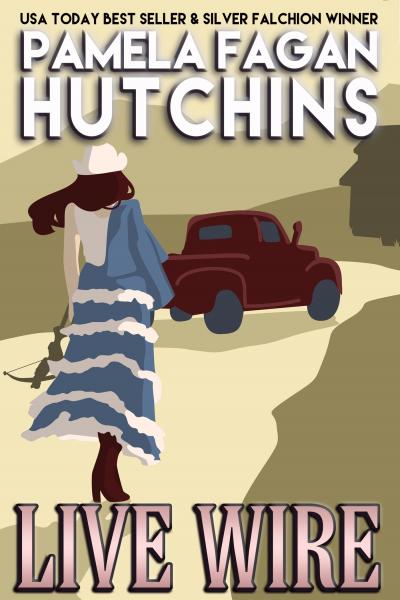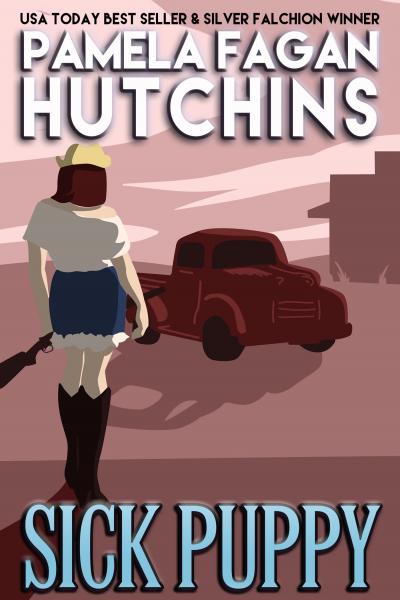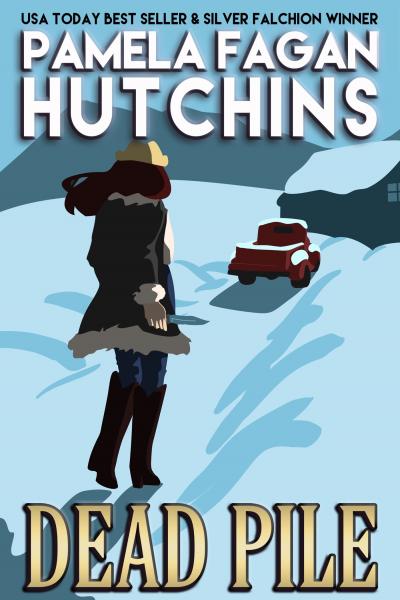
"The myth of balance is that I basically sprint from one lopsided moment to the next."
A handful of short stories. Two novellas. Seven nonfiction books, including her first book, the “real snoozer” PREVENTING WORKPLACE HARRASSMENT, penned in 1998 and a collaborative effort with some other attorneys. Fifteen novels and counting as her latest book, DEAD PILE, celebrates its book birthday as this interview publishes. Pamela Fagan Hutchins is a woman on a mission, and she talked to Lone Star Lit via email to give us a peek behind the scenes.
LONE STAR LIT: We connected a few years ago but only recently met in person. My takeaway from the few hours we spent together is that you are a force of nature. You are involved in every aspect of each of your books from concept to covers to marketing. You and your husband run SkipJack Publishing. You host Wine Women and Writing video interviews and writers’ retreats. You blog and are interactive on social media. I know you are fueled by coffee, but how do you manage and balance it all?
PAMELA FAGAN HUTCHINS: Ah, that’s what my husband says, too (force of nature), and I’m not sure that either of you meant it as a compliment. I also hear, “You exhaust me.” And last week someone asked if I use cocaine (it was sort of a joke, but … not completely). The myth of balance is that I basically sprint from one lopsided moment to the next, LOL Honestly, I tend to do things in binges. If I’m writing, I WRITE. If I’m launching, I launch.
So, you stay singularly focused on the tasks at hand, but is there structure?
Yes. Mornings are for the business of publishing, which includes everything from evaluating new authors or helping existing ones, preparing for or delivering workshops or retreats, interviewing authors on my podcast, working with cover artists, providing training and direction, and, yes, Facebooking, and so, so much more. Afternoons are for writing. Evenings are for reading or firefighting the little things that never seem to quit heating up. I’m lucky to have my husband Eric as such a great strategic partner, and our publishing assistant Bobbye who can do ANYTHING. I always use the same copyeditor and proofreaders. I have a fantastic cover art team. And a bookkeeper. Oh, my gosh. When I was doing our books—that was enough to make me quit writing! Recently I’ve narrated the Maggie audiobooks as well, which knocked a month out of my year. But only the afternoons, because I considered that akin to a writing (product-generating) activity. Luckily, I enjoy working in this field, and I am a hermit who doesn’t have much of a social life, whose husband travels a lot, and whose kids are grown. But I love my horse. She needs more attention and I need to exercise more. #LifeGoals
You make no secret that as an author, you put your BANA (business analysis) degree from Texas A&M to work nearly every day. This may be surprising to some readers and even some authors. Can you share a little about how vital this is to your success?
Oh, my. I am such a computer geek, and it has been a big advantage. In the beginning, having strong computer savvy helped me learn and navigate the technology required to put together books and to manage them as assets online on the 10+ different vendor sites where I have them on sale. However, that’s the tip of the iceberg. Where business analysis has been critical is in developing, implementing, and tracking strategy. I am the queen of the spreadsheet. What can be measured can be improved! I am a big believer in tracking the lifetime value of a sale, so I can calculate the return on investment of promotion and advertising. Through harnessing numbers, my team was able to determine at what process in the life cycle of a book we were failing (or maybe “not doing as well as we wanted” is a better way to put it). This required changes in blurbs and covers, changes in advertising and promotion strategy, even in how we categorized books, used SEO and keywords, and, yes, even hashtags.
Clearly there is no sitting back and enjoying success in your business model – you do and re-do what it is necessary. Speaking of doing what it takes to be successful -- from the outside looking in, it appears you are nailing this author thing and must be making big bucks doing it. You shared a story with me about how the launch of KDP Select’s Kindle Unlimited changed everything for you. Will you share some of that with our readers?
Prior to Amazon’s Kindle Unlimited (where, for a set monthly fee, readers get unlimited reads out of the pool of books authors are willing to commit exclusively to the program), I was pulling down royalties of $200,000, out of which I paid expenses and myself. Since the advent of KU, the median author makes nearly 50% less in revenue, myself included. Not only that, but it is now harder/more expensive to generate those sales.
But I have doggedly refused to give up broad distribution for KU exclusivity, even though I believe it I has cost me a fair amount of money, because I think exclusivity is bad for authors and for readers in the long run. {Authors in KU still have a more challenging time than a few years back, for some of these same reasons, but it’s offset by other factors like higher royalty percentage on sale books.}
Finally, ebooks are forever (or, nearly forever) so the choices for a reader are overwhelming. Individual authors find it increasingly hard to gain visibility and achieve sales volume.
Wow, that was all probably really confusing J Suffice it to say I spend three times as much and make half the money, while writing more books. You do the math.
Something that comes through loud and clear is that you want to retain control of your own work. Many authors would vastly prefer to relinquish control of their books to someone else, and I get that: it seems ridiculously hard to be in charge. Why is being in control so important to you?
I am a Capital C Capital F control freak. I have watched other authors deal with lack of control of whether or in what order their books would be published, the covers, the editing, the pricing, the categorization, the back cover/sales site descriptions, the formats, where they’re sold, etc. Basically, they control none of that, and thus they have very little ability to impact whether or not their books end up in the hands of readers. It’s simply not enough to write a good book because good books are still invisible unless you can do something to draw readers to them. Even though the vast majority of authors are responsible for their own promotion, most of them do not have the ability to control the elements that make the books promotable.
I want my books to be enjoyed by readers, and I absolutely love that I have the power (through control) to find those readers myself.
You’ve said you’ve learned at multiple author conferences that new content every thirty days is key to book sales and staying relevant to readers. I know with the Maggie books, your latest in the What Doesn’t Kill You series, incredibly, you have released one after another, three books in three months. What does “new content” look like when a new book isn’t publishing? Would you recommend this method to other authors?
This year I will publish the three Maggie novels, plus:
(4) a Maggie short story (SHOCK JOCK)
(5) a Maggie novella (BUCKLE BUNNY)
(6) a Maggie novel box set
(7) a Maggie “short” box set
(8) a What Doesn’t Kill You series guide
(9) a What Doesn’t Kill You MEGA Box Set
(10) “Then There Were Five” first-in-trilogy box set
And some other stuff…I’m missing a few
I definitely hear repeatedly how important it is in the all-important algorithms to keep publishing, but it’s a leap of faith, since I have no idea how I’d be doing if I slowed down a little. However, I will tell you that in the one year since I adopted this strategy, my sales have doubled from the atrocious level they’d fallen since the advent of KU (I am still making half what I did before—they have fallen by 75% originally). That is not the only change I have made, so it’s impossible to isolate just one cause, but I don’t think it has hurt. I think each author has to figure out her own pace and then commit to write at that pace. The big thing is to hold yourself accountable to your own level of production. If that is one book a year, then commit and stick to it. If it can be more, then I say, why not? But don’t “float” and let it be less. Hold your own feet to the fire.
As this interview goes to press, Dead Pile, the third Maggie book is celebrating its book birthday. Congratulations! Personally, I am hooked on Maggie and think she’s your most brilliant character yet, and I cannot wait to read this book. Can you tell us about the book? (and is T-Mobile ever going to be redeemed?)
Thank you! I love Maggie. And if T-Mobile ever gets decent coverage/partners in Wyoming, I’ll lay off them, but as it is, I have partial vacations from my cell phone for six months every year because of their terrible coverage. (Are you listening T-Mobile?)
About DEAD PILE: One day my husband and I were riding horses on a friend’s ranch in Wyoming, and we saw a bunch of dead cows on a hillside. “What happened to them?” we wondered. A lightning storm? A cluster of deadly poisonous plants? Extra-terrestrial invaders? We asked our buddy, and he informed us that it was just the dead pile, where they put their deceased livestock. And I immediately thought of how awesome it would be to write a book where there were more than just cattle in those piles, and have Maggie thrown right into the thick of things. It’s a great mystery, but there are other things I love about DEAD PILE, too. I loved including Maggie’s Crow ancestors’ history, the local Amish culture, Lily the pregnant draft horse, and Louise the border collie-corgi mix, and, of course, more challenges for Maggie and Hank.
You are publishing new novels and novellas at a furious pace (THANK YOU), but what’s your ultimate plan for yourself as an author? Do you have a magic number you are trying to hit with your catalog of books?
I really want to make it through 18 novels for the six protagonists of the WHAT DOESN’T KILL YOU series, as I originally envisioned it. I am at 15 novels and 5 protagonists now (I write a trilogy for each protagonist within the series), plus some novellas and short stories. Then, I hope to slow down and try a few new genres. I have a contemporary romance I’d like to write as well as a few historical novels. But it’s really, really hard to break the habit of writing murder mysteries!!
You regularly write blog posts and allow readers in to your personal, even intimate spaces. One of your posts and a story you shared on your Lone Star book blog tour of Live Wire was about how your real-life experience with a stalker made its way into that book. How much of what you write stems from your own life experiences?
Yes, it’s true, I am a chronic oversharer. The best character traits and anecdotes in my books come from real life, and so have a few of my best plot lines: the stalker in LIVE WIRE, the jumbie house in the Katie books, the abandoned art gallery owner in FIGHTING FOR ANNA. But still I’d say the percentage of true versus completely made up or merely “inspired by” is very low. Recently, however, I wrote one of our dog’s names into DEAD PILE, and the dog passed away a few months later. I wrote a horse inspired by my own horse in DEAD PILE, too, with a scene where she is caught in and injured by barbed wire, only to have my horse Katniss nearly die in a barbed wire accident before the book was published. In the future, I’m going to be a lot more careful about what and whom I write about!
Lightning Round:
Favorite book? LONESOME DOVE
Number of books on your nightstand? eReader? TBR right now, 9
Strange habit? Does wearing my wet hair in twisted clippies for 3 days without brushing it count?
Interesting writing ritual? Jewelry that I wear as I write each protagonist!
Funniest flaw? My editor would say it’s my incorrect use of hyphens. My husband would say it’s my ability to burn any and every food I’ve ever tried to cook. My kids would say it’s that I cancel social engagements because I cover up painful introversion with being outgoing and saying yes to things I dread. My mother would say it’s that I refuse to talk on the phone.
Favorite quote? If not me, who? If not now, when?
Pet peeve? People who try to force me into talking on the phone. See above!
Most underappreciated author/hidden gem author? Ann Weisgarber
Team Oxford comma? Oh, HELL YEAH!
Pamela Fagan Hutchins is a USA Today best seller. She writes award-winning romantic mysteries from deep in the heart of Nowheresville, Texas and way up in the frozen north of Snowheresville, Wyoming. She is passionate about long hikes with her hunky husband and pack of rescue dogs and riding her gigantic horses. If you'd like Pamela to speak to your book club, women's club, class, or writers group, by Skype or in person, shoot her an e-mail. She's very likely to say yes. You can connect with Pamela via her website or e-mail.



